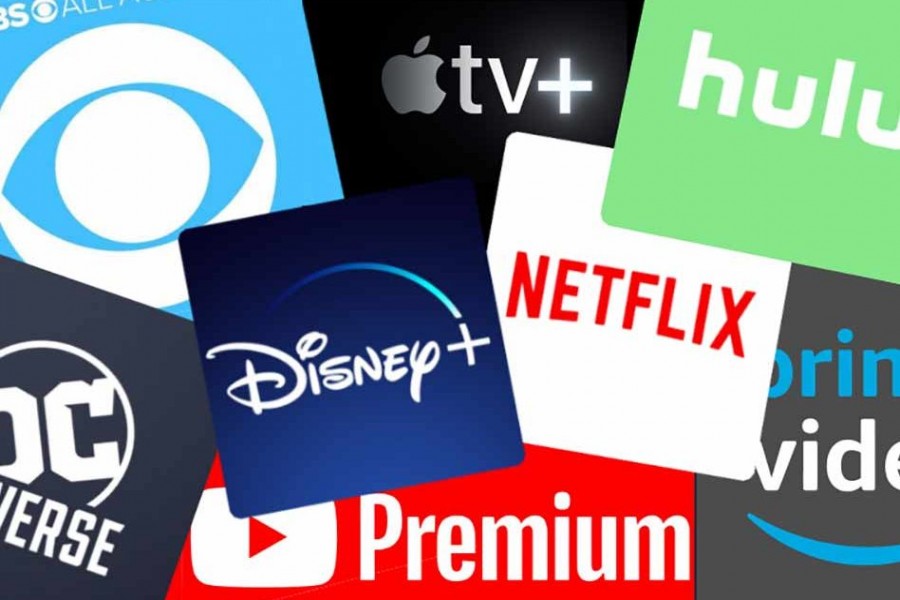After radio, when television first came to Bangladesh, it changed the landscape for media. Satellite channels brought more options and TV-watching freedom for the viewers. What is newer are streaming services.
Getting popular in Bangladesh recently, online streaming apps and websites are taking over the television industry by storm. People now have started loving these platforms over television because they have, arguably, better content, exclusive shows, movies and faster premiers.
Netflix opened its services in Bangladesh back in 2016. Since then, it has no looking back. Currently, the number of its active subscribers in the country is around 200,000. According to the Bangladesh Telecommunication Regulatory Commission’s (BTRC) data, Netflix earns around $21.6 million from Bangladeshi subscribers. Other over-the-top (OTT) services include Spotify, Hulu, Amazon Prime and Disney Hotstar, among others. These platforms which could have done better in the country are facing some setbacks too. Here are seven such issues:
AVAILABILITY AND LEGALISATION:
Among the top-rated subscription-based services, only Netflix is available in Bangladesh. Other platforms, like Amazon Prime, Hulu, Spotify, and Tidal are not officially available here. The users of Bangladesh cannot download these apps legally from the playstore or appstore. Despite being officially available, Netflix uses US dollar as its subscription currency. To pay the subscription fee, one needs a credit card that has been endorsed and is equipped with the international transaction (e-commerce). A statistical report shows that only around 0.2 per cent of the users in Bangladesh legally engage in transactions through their own credit cards.
MARKETING:
Bangladesh Telecommunication Regulatory Commission (BTRC) has allowed Netflix to place cache servers in Bangladesh. But, it has not yet launched its official channel of Netflix Bangladesh on YouTube. Although Netflix does not entirely rely on marketing, many people are not aware of the fact that Netflix is available in Bangladesh, because of its lack of proper improvisation of a few marketing policies. Till date, no television commercial has been made or aired for grabbing Bangladesh’s Netflix consumers. Neither are there social media campaigns for the popular streaming service. Streaming platforms like Bongo BD have flawed marketing policies. So, even though they have an excellent content library, user-friendly interface and ease of payment procedure, most of the people in Bangladesh have little or no idea about its existence. Jarin Tasnim, a student in Islamic University of Technology, says, “Being a three-year subscriber of Netflix, Spotify and Hulu, I haven’t heard of any renowned streaming services based in Bangladesh.” She felt surprised when she got to know that there are many subscription services based in Bangladesh that are currently active.
BANDWIDTH:
The bandwidth local telecom operators are providing currently is not effective and quite unstable for continuous high definition streaming on-the-go. Besides, there are not sufficient cellular towers placed across the rural and urban areas of the country.
TELECOM BASED SERVICES:
Services like Banglalink Vibe, Robi Music, and Bioscope are limited to Banglalink, Robi, and Grameenphone users respectively. This setback limits the number of users the platforms could have attained, had they turned these to cross-platform applets.
LACK OF QUALITY CONTENTS:
The streaming services that currently exist in Bangladesh lack quality contents over quantity. Although most of them individually claim to have thousands of contents, both original and licensed, they do not possess high-quality contents that could be persuasive enough to gain more subscribers in our country.
LOOPHOLES IN LEGALISATION PROCESS
The legalisation process is not friendly enough for new streaming companies. For instance, during an interview in a national daily, the CEO (chief executive officer) of Bongo BD, Ahad Mohammad said that “it took us a year and a half to get our approval from BTRC, which would allow us to sell content through the telcos (telecommunication companies).” Furthermore, he added that “the process of getting our license, shortcode and everything, getting the telcos believing us, took almost two and a half years. Copyrights have also been a big challenge because the copyright industry here is not that well-defined and regulated. More issues such as the producer signing the same exclusive deal with multiple people also cause setbacks.”
So how can the streaming services be better in Bangladesh? Let’s have a look at some way-outs:
- Strict and monitored legalisation process for streaming services
- Increasing scopes for affiliation with major streaming services and production houses
- Stop and/or limiting piracy of licensed entertainment contents
- Taking necessary steps for attaining international exposure
While these steps may not be enough to guarantee the full-fledged thriving of streaming services in Bangladesh. Keeping the goal of establishing a true ‘Digital Bangladesh’ in mind, flourishing streaming services in the country is quite inevitable. Therefore, the authorities should focus more on brandishing the prospects of streaming services with a view to expanding new relevant businesses and startups nationally and gradually progressing to international exposure in the future, to make it the next big thing for us.
The writer is a student of Business and Technology Management at Islamic University of Technology (IUT). He can be reached at [email protected]


